Trusted SSL Certificate Company
SSL Certificate
Where to buy SSL Certificates India? Digital247 Top and Best SSL Provider at Cheap Price in India. Best worldwide SSL You can buy SSL Certificate Extended Validation (EV), Domain Validated (DV), Organization Validation (OV) at Digital247
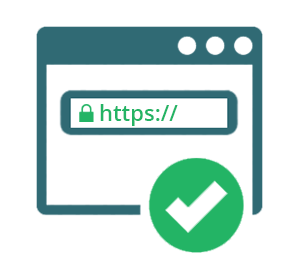
Best SSL Certificate Plan
Basic SSL
INR 999/-
- Basic SSL
- 1 Domain
- www.site.com
- Domain Validation
- https://prefix
Standard SSL
INR 1999/-
- Standard SSL
- 1 Domain
- www.site.com + site.com
- Domain Validation
- https://prefix
EV SSL
INR 8999/-
- Comodo / DigiCert / GlobalSign
- 1 Domain + Sub
- www.site.com + site.com
- Domain Validation
- https://prefix
PositiveSSL Wildcard
INR 14999/-
- Comodo / DigiCert / GlobalSign
- 1 Domain + Sub + Mail
- www.site.com + site.com
- Domain Validation
- https://prefix
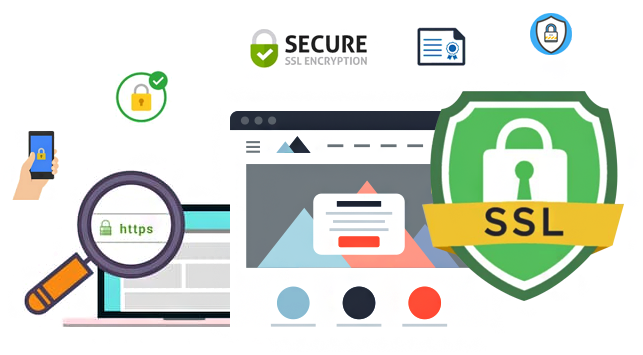
Do you think your website is secured from cybercrimes? Do you want to find out? Digital247 helps you to secure your web through SSL certification.
We are one of the accredited SSL Certificate Provider in Delhi. We deal with leading certificate providers such as Symantec, Thawte, Globalsign, Geotrust and Comodo and help you to buy SSL certificates SGC, EV SSL certificates, SAN SSL certificates and other digital certificates.
SSL certificates enable encryptions through Secure Socket Layers to protect data that are transferred over web. A public and private key are used to encrypt and decipher information. When browser lists a secured domain, the SSL handshake validates the client and the secured server and procures an encrypted code and a key.
Through this, users can securely make online transaction without having to worry about cyber-attacks.
Contact Details
Affordable SSL Certificate Packages
Features of SSL Certificate
Validation of the web server and website identity.
Encoding information for the web server through Secured Socket Layers (SSL).
Once the Symantec Server ID is installed, SSL will be automatically activated by your server.
The SSL will then create an aisle of secured communication between your and your client’s server.
Hereafter, any client of yours using Netscape Navigator or Microsoft Internet Explorer can communicate with you securely.
Once the SSL certificate is actuated by your Server ID, it will provide you with a flow of secured transaction and encrypted data.
Why Your Website Needs to Purchase SSL Certificate?
Government laws and legal entities work as an assurance in real world business.
The legal and registration documents confirm the physical location of companies.
However, the same cannot be ascertained or validated on the net and thus, the domain names can be easily manipulated.
Faith is the only option that works as a link between the website and it’s said physical company.
The cost incurred in informing each and every client about company’s correct website is very high.
Rate of cyber-crimes has increased manifolds during the last decade. No one would like to be misguided by wrong direction.
Internet privacy can be easily accessed and hacked so we should respect our client’s privacy on the net.
What is an SSL Certificate?
SSL Certificates are small data files that digitally bind a cryptographic key to an organization’s details. When installed on a web server, it activates the padlock and the https protocol and allows secure connections from a web server to a browser. Typically, SSL is used to secure credit card transactions, data transfer and logins, and more recently is becoming the norm when securing browsing of social media sites.
SSL Certificates bind together:
- A domain name, server name or hostname.
- An organizational identity (i.e. company name) and location.
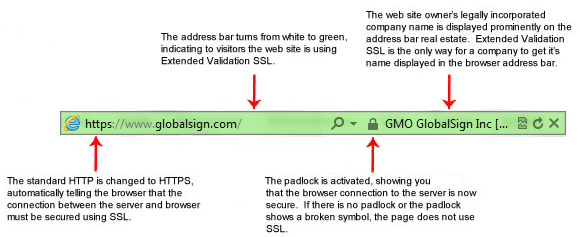

An organization needs to install the SSL Certificate onto its web server to initiate a secure session with browsers.
Once a secure connection is established, all web traffic between the web server and the web browser will be secure.
When a certificate is successfully installed on your server, the application protocol (also known as HTTP) will change to HTTPs, where the ‘S’ stands for ‘secure’. Depending on the type of certificate you purchase and what browser you are surfing the internet on,
a browser will show a padlock or green bar in the browser when you visit a website that has an SSL Certificate installed.
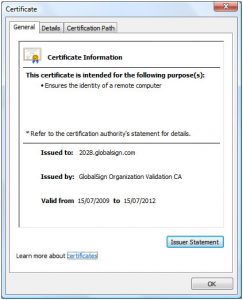
SSL Certificate Details
To view the details of an SSL Certificate, go to a secure site, click on the padlock and select “View Certificate”.
All browsers are slightly different, but the Certificate always contains the same information.
Why is the Root Certificate important?
SSL Certificates need to be issued from a trusted Certificate Authority’s Root Certificate, and preferably by a 2048 bit Certificate that’s widely distributed.
The Root Certificate must be present on the end user’s machine in order for the Certificate to be trusted. If it is not trusted the browser will present untrusted error messages to the end user.
In the case of e-commerce, such error messages result in immediate lack of confidence in the website and organizations risk losing confidence and business from the majority of consumers.
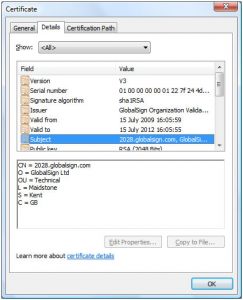
Companies like GlobalSign are known as trusted Certificate Authorities. This is because browser and operating system vendors such as Microsoft, Mozilla, Opera, Blackberry, Java, etc., trust that GlobalSign is a legitimate Certificate Authority and that it can be relied on to issue trustworthy SSL Certificates. The more applications, devices and browsers the Certificate Authority embeds its Root into, the better “recognition” the SSL Certificate can provide.
GlobalSign has, for over 15 years, been operating the GlobalSign Ready program for Root Certificate embedding. This program ensures its in-house engineers from America, Europe and Asia are in constant communication with the application, device and browser vendors to ensure the GlobalSign Root Certificate is present everywhere that may be used for SSL sessions.
The GlobalSign Root Certificate is marked for a number of intended purposes. This makes it a very strong and flexible Root Certificate able to perform all Public Key Infrastructure (PKI) related activities:
- Ensures the identity of a remote computer
- Proves your identity to a remote computer
- Ensures software came from software publisher
- Protects software from alteration after publication
- Protects e-mail messages
- Allows data to be signed with the current time
- Allows data on disk to be encrypted
- Allows secure communication on the Internet
- Permits all key usage policies
- OCSP Signing
